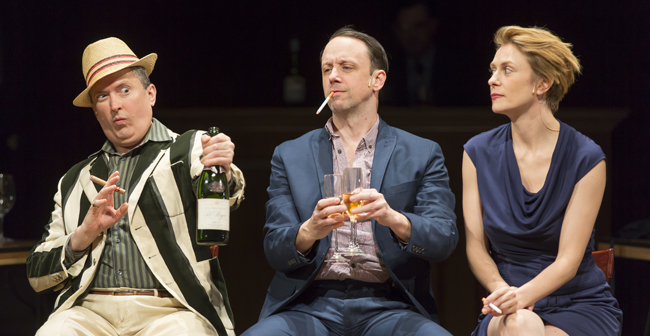Culture

Dudes and Drinks: ‘The Select (The Sun Also Rises)’ at Shakespeare Theatre
March 27, 2017 @ 12:00am
Ernest Hemingway’s The Sun Also Rises follows a group of post-war American and British expatriates as they party their way through 1920s Paris and Pamplona, Spain. In the wildly acclaimed stage adaptation of the book – now playing at Shakespeare Theatre Company’s Lansburgh Theatre through April 2 – members of the NYC-based Elevator Repair Service company drink, dance and fight their way through Europe with much romantic intrigue. Most is centered around the female lead, Lady Brett Ashley (Stephanie Hayes), and all the men who love her. But there is another kind of romance brewing – the ultimate “bromance” – between Jake and his best pal, Bill.
I had the opportunity to sit down with three cast members before a performance: Mike Iveson (Jake), Robert M. Johanson (Bill) and Kate Scelsa (Francis). We talked about drinking, writing and masculinity.
“He (Hemingway) is not a terrible portrayer of women,” says Iveson. “He’s obsessed with women. But he’s also obsessed with the masculine experience.”
Hemingway’s short stories “are almost always about dudes – two guys going out and experiencing the country, and then they bond over lots of drinks,” Iveson adds.
In this story, Bill is the only person Jake can trust. He confides in Bill about his secret love for Lady Ashley and the doomed nature of it – an injury during the war that left him impotent. The two also share literary jokes, have the same taste in writing and can hold their liquor. The thinly veiled account is essentially a reportage of people Hemingway knew and an actual trip they took to Spain. He only changed the names; Jake being a portrait of himself. The book was Hemingway’s debut, and it made him a literary star. In between the scenes of Parisian nightlife and the running of the bulls and ensuing bullfights in Pamplona, Jake and Bill go fishing.
“We call that Brokeback Mountain, the fishing scenes…that’s very easy to go there for us,” Scelsa jokes. “They take naps together…it’s very romantic. The way these two [Iveson and Johanson] play it, it breaks my heart when they say goodbye to each other. I mean it’s like, ‘Don’t leave each other, you’re in love…forget about Brett.’ That’s the real romance here.”
Joking aside, the relationship between Bill and Jake thrives because they both boast a certain kind of masculinity. The author’s matter-of-fact telling of the story reflects the idea that masculinity is in only saying the necessary details. But, as Iveson points out, “I think he thinks details are okay if it’s about…guy stuff. Manning up for him is like, ‘I had a terrible fight and now I need to cry about it.’”
Hemingway also projects fears regarding flaws in his own masculinity on the much-maligned figure of Robert Cohn.
“Cohn is held up as having all these unmanly qualities that sicken Jake all the time…[yet] often things happen to Cohn in the book are from Hemingway’s life,” Iveson says.
Much is made about Cohn being Jewish. The message is clear – Jews are weak and un-masculine.
“One of the interesting things about reading this book is knowing that WWII is coming,” Scelsa says, “and looking at the anti-Semitism …and that after WWII everyone was very much ‘settle down, get married, have babies.’”
“And the world economy crashes too, because that has not happened yet either,” Johanson adds.
And then, of course, there’s the drinking.
“It was a very different drinking culture in the 20s,” Johanson says.
Scelsa adds, “Everyone’s drinking most of the time. I start the show downing three large glasses pretty quickly, and then another one a couple scenes after that.”
“[I have] two martinis and four glasses of red wine in about three minutes, because it’s the end of the show and Jake is getting drunk and it’s an intense moment,” Iveson explains.
So much beer, wine, Pernod and whiskey flows during the performance that “it makes everyone in the audience want a drink,” Scelsa says, laughing.
Lucky for the cast, it’s all fake. Tea and juice fill up most of the glasses, with a concoction of creamer and food coloring to create the Pernod. All of it is watered down. Red wine is the most difficult to recreate, and the stage manager has to find a different juice in every city. For awhile, purple carrot juice worked well, but the same brand was not available in every city on the tour. The change was an unpleasant surprise to the cast.
“It was nasty,” Iveson says with a shudder.
“Drinking accomplished two things,” Scelsa says. “Numb feelings, but also making things exciting…instead of dealing with real feelings [about the war].”
These characters, men and women alike, experienced trauma and injury in battle, and now they live every day as if it were their last. The Select (The Sun Also Rises) is a glimpse into the daily lives of a group of somewhat reckless writers and their cohorts who, as history would show, were only allowed a moment between the tragedies of two world wars to celebrate their youth.
Don’t miss the final week of performances through Sunday, April 2 at Shakespeare Theatre Company’s Lansburgh Theatre. Tickets start at $59.
Lansburgh Theatre: 450 7th St. NW, DC; 202-547-1122; www.shakespearetheatre.org








